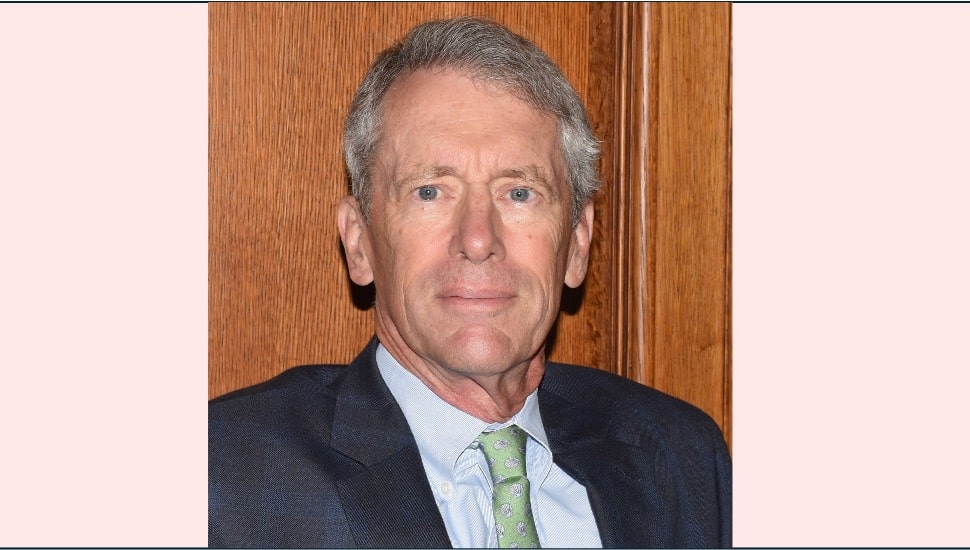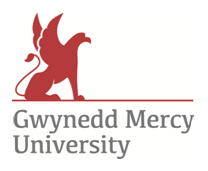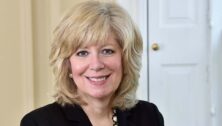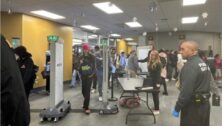Bucks County Leadership: John Kepner, Board Member, Gwynedd Mercy University


John Kepner, a board member at Gwynedd Mercy University, spoke with BUCKSCO Today about growing up in North Jersey, where a chance friendship sparked a lifelong passion for diversity and social justice. He also recalled learning the value of hard work from his summer job at Prudential Life Insurance.
Kepner discussed his career in law and healthcare, including his work with the University of Pennsylvania Health System, and why he decided to take a yearlong sabbatical after retiring. He also spoke about his passion for social service and the College Student Basic Needs Program which makes sure under-resourced students have food and affordable housing.
Where were you born and where did you grow up?
I was born the youngest of three children and the only boy in Allentown. My family moved to Quakertown when I was five years old and then to North Jersey when I was ten.
What did your father and mother do?
My dad was a training consultant for Prudential Life Insurance, which is why we moved to Prudential’s home office in Newark, New Jersey. When he passed away (I was 11 years old at the time), my mother, who had a college degree, quickly found a job teaching school in Glen Ridge, N.J. where we lived.
What memories stay with you from your childhood?
One memory stands out. I was too young to remember the details, but my sister, who is 10 years older than me, told me about it and I trust her recollection.
Glen Ridge was (and still is) almost all white. The street next to ours, in Montclair, was all Black. I was young and, not seeing any difference, immediately struck up a friendship with a Black kid my age from the next street over.
A few days later, my dad got a call from a man in our neighborhood who had seen me playing with my new Black friend. He told my father that my playing and being friends with a Black kid wasn’t appropriate. Without missing a beat, my father told him to “pound sand” and hung up the phone!
That experience and my father’s example fueled my lifelong passion for what we now call DEI or diversity, equity and inclusion.
What jobs did you have in high school?
My first job was working at Prudential the summer after my senior year in high school. I worked in the janitorial department that summer and eventually worked my way up to being a programmer in Prudential’s data processing department three summers later.
At the end of my final summer, the department head pulled me into his corner office and told me I had a bright future at the “Pru”. I remember wondering to myself, “How do I tell this guy that a career at Prudential isn’t on my career trajectory?”
What lessons did you learn at that early job that influenced how you work today?
The first one was the value of hard work which I learned from a guy who hardly did any work! He had been there 40 years and managed to skate through every day without doing much of anything! I remember thinking – hoping, actually – that being an adult and working would be more fulfilling than working with that guy.
The second was cleaning the executive offices at Prudential. The furniture, the wastebaskets, the views – everything was nicer in the executive suite. I remember thinking I should aspire to work “at” an executive desk rather than clean one.
Did you play any sports when you were growing up?
I played football and ran track in high school and track in college. Our high school teams won two state championships in football and three in track. More importantly, Bill Horey, our track and football coach, was a great role model who, I guess, saw promise in me. Not seeing myself as a quarterback, he did. I guess he knew I was a good student and could learn his sophisticated offense quickly. My teammates and I learned a lot about teamwork and other aspects of leadership from Coach Horey. Many of us stay in touch years later.
Is there one football memory that stands out for you?
Before my senior year, I worked at a summer camp Coach Horey ran. I spent the summer there getting into maybe my best running shape ever. We had a play when, if the other team kicked off deep, our receiving back would start up the middle and handoff was to me and I’d circle around a wall of teammates and run up the sideline. Well, one day I got the handoff and the wall was perfect. I had a clear field ahead of me, and I ran all the way for a touchdown … except that when I made my last cut “to daylight”, I stepped out of bounds. My great moment of glory was short-lived.
You were a pretty good student and athlete. You could have gone anywhere to college. Where did you end up going, John?
I went to Wesleyan University partly because my mother wanted me to go to Harvard, Yale or Princeton! And, two fellows that were a year ahead of me whom I admired went to Wesleyan.
The good news is that Wesleyan, in my freshman year, made a significant decision to diversify. By the time I graduated in the class of ‘68, ten percent of our student body was African American.
Was Wesleyan a good choice for you?
It was, except we were the last class that was all men. Wesleyan wasn’t a good environment as far as dating was concerned.
What music floated your boat way back then in high school and college?
The ‘60s rock stuff was big. I loved Motown. My friends and I went to a Motown Revue live show in Newark one summer when we were home from college. We were the only white people there. We just loved the music.
When you got out of Wesleyan, who saw promise in you?
I went to Penn Law School to become a civil rights lawyer. The summer after my first year in law school, I worked at Newark Legal Services. I worked with a senior lawyer who was providing matrimonial and family services for the community in downtown Newark on Central Avenue. He was terrible. He was just picking up a check. I said, “If this is the way legal services are run, I want to learn in a different environment where excellence is the standard.”
So, I decided to get a clerkship the next summer with a large law firm where the best lawyering happens. I picked Saul, Ewing, Remick & Saul in Philadelphia, which had a Quaker tradition and a poverty law office in Mantua. I got into that realm, and indeed, it was excellent training.
The senior lawyers at that firm followed a strong tradition of mentoring, and they really helped me in terms of my professionalism. Robert W. (“Bob”) Sayre was a strong influence in his commitment to social justice and James W. (“Jim”) Schwartz taught me the practical and relationship aspects of a business practice. I was also lucky to have two partners, Arthur R.G. Solmssen and Winston J. Churchill, who both wrote novels, teach me how to improve my writing.
As an associate I wrote a business plan to develop a healthcare practice. Nobody had ever done anything like that before. But, the managing partner at the time, Edward F. (“Ted”) Beatty, Jr., said, “Go ahead, do it.” That led to my building a substantial healthcare practice and shaped my future professional direction.
After 22 years of legal practice, including several final years of internal, sometimes painful debate about my future career, I decided I didn’t want to be a lawyer after all. I wanted to be an executive in, instead of just an adviser to, a health care system. I was by then doing legal work for Penn about forming a health system. I knew the health care community (pretty unfamiliar to Penn at the time) and had business development skill sets that seemed to make me a good fit. I began working almost daily with the Penn executive team. It wasn’t as much lawyering as it was giving business advice.
One day, I said to one of the lead guys there, “I’d like to do this.” He said, “What do you mean ‘do this’?” I said, “I’d like to build that primary care network” we were working on at the time. They took a risk and hired me as an executive to help build the health system.
There were two physicians I worked very closely with at Penn whom I really admired. One, Paul Rogers, was a lead physician at the first large physician group we bought, Phoenix Medical Associates. We worked closely to get that transaction done. He was not only a fine internist but a very astute businessman! So good, in fact, that I hired him as our chief medical officer for the primary care network, and off we went to recruit other primary care physicians to join the network we built together.
The other one was Mark Kelley, a highly subspecialized Penn critical care physician, who helped us establish strong clinical relationships between our community physicians and Penn subspecialists. Accompanying his impressive Harvard and Penn academic “tickets”, Mark had a genuine authenticity that played well in the community. Paul has passed away, but Mark and I are still friends today.
How did you become associated with Gwynedd Mercy University?
During most of my career, I had outside activities that were on the social service side of things. My wife, Mimi, and I have had a long relationship with Episcopal Community Services, a social services agency in the Episcopal Diocese of Pennsylvania. Starting in my early 30’s, I was on various ECS committee and ultimately became the president of the board. Later, Mimi did too. ECS is where I learned how social service agencies work and the impact they can have.
I had other activities involving faith-based organizations, and my last job was with Holy Redeemer Health System (now, Redeemer Health).
As a healthcare lawyer, I had the benefit of representing several Catholic hospital clients. Back in those days, at least two of the hospitals I represented had religious women running them and I marveled at how these well-educated, inspiring women made mission-driven decisions.
I took a self-imposed one-year “sabbatical” after I retired from Holy Redeemer in August 2015. I did a lot of reading and talked to people in the social service and education areas. I had kicked my spirituality down the road a lot, so I focused on that too. I took painting lessons, inspired by my sister and niece who are lifelong artists. I did a lot of writing in an effort to hone those skills. It was a great year because, for the first time, I had the personal freedom to go in any direction I wanted.
At the end of the year, I decided to put my career-acquired skills and energy into board positions where I could have an impact helping young people who don’t have the opportunities and resources I had growing up in terms of education and mentoring. Gwynedd Mercy University fit the bill. Well over 50% of our undergraduates are “first to college” in their families. I also joined the boards of Philadelphia Youth Sports Collaborative which provides resources and advocates on behalf of youth-based sports programs in Philadelphia and Health Spark Foundation which supports safety net organizations and racial and social equity causes in Montgomery County.
So, why Gwynedd Mercy in particular?
While I was at Holy Redeemer, I had the benefit of meeting two interesting people who were also involved at the University. One was Larry Stuardi who, at one of our monthly breakfasts, said “You’ve got to pay attention to this place.” The other, current GMercyU board chair, Charlotte McKines, was also board chair at Drueding Center, a subsidiary of Holy Redeemer that helps women ages 18 to 25 with children transition to affordable housing. Larry and Charlotte were very instrumental in recruiting me to the board.
There’s something else that attracted me to Gwynedd Mercy. Gwynedd Mercy’s mission, core values and the sisters’ principal concerns – Earth, Immigration, Anti-Racism, Non-Violence, Women – resonated with me. The mission is embedded in everything that’s done there – the curriculum, student service projects, our approach to diversity, equity, inclusion and belonging – everything. It’s called “mission integration”. I talk with students, faculty and administrators about it, and they reflect it in what they do all the time.
Gwynedd Mercy has also been a strong supporter of the College Student Basic Needs Program. In my first year, I was sitting at a board meeting next to Larry Stuardi. I’d seen in his committee report that a lot of our students were food and housing insecure.
After the meeting, I asked my now fellow board member Sister Katie McMahon, who was then the vice president for mission, about it. She convened a group from different parts of the organization to brief me. At that time, Catherine’s Cupboard, the food pantry on campus, had just a few shelves of food underneath a staircase. I just couldn’t see how a student could study and succeed on an empty stomach and/or half asleep from couch-surfing or living in a car while also holding down a rob and maybe tending to a 2-year-old. I networked to our nearby Community College and Manna on Main Street, a terrific full-service food pantry in Lansdale, to do something about it. Now, we have seven community partners in a consortium helping under-resourced students on three campuses in Pottstown, Blue Bell and Gywnedd Valley with food and housing programs that are making a real impact. And, we’ve been able to raise enough money to support a new full-time executive director who we hope will take our programs to other colleges and food pantries across Montgomery County.
Here we are, a quarter of the way into 2024. What are the priorities? What are you focused on as a board at Gwynedd Mercy?
After my first year, we recruited Dr. Deanne D’Emilio to be our President. She has turned out to be an incredible leader. She’s a servant leader, a natural fundraiser and very genuine. It’s not about her. She lets her executive team shine and have access to the board.
Our biggest challenge is enrollment. It drives revenue. We were hit by the pandemic just like all the other colleges. Dr. D’Emilio’s “bridge plan”, just approved by the board, positions the University to manage all the internal and external factors driving enrollment.
You’re getting Saint Charles Borromeo Seminary.
Yes, that was an amazing transaction. One of our former board members, Brian Regli (now with the Shapiro administration), had a principal role in helping shape that transaction. The results are quite evident from the seminary buildings going up behind our campus.
With that transaction and the sale of our East Campus property concluded, we are now well-positioned to build our new health care innovation center. We can see the future, and hopefully, those and other reasonable “investments” we are making in new and enhanced academic programs, dorm renovations and our new baseball and softball fields will, I believe, pay off in terms in terms of sustainable undergraduate and graduate enrollments.
Finally, John, what’s something big that you’ve changed your mind about over the last 10 years?
I would harken back to the sabbatical year I mentioned, when I, for the first time, had the freedom to think about what really mattered to me.
What keeps you hopeful and optimistic, John?
That’s a question we ask guests on the monthly Race to Social Justice podcasts I produce with my friend Keva White. A recent social service executive, who runs a unique program for high schoolers in Wichita, Kansas, answered it was “our young people” who keep her hopeful, citing amazing achievements of kids in her programs.
I couple that with the real power and innovation that can occur at the local level. I’ve lost confidence that we can do major things in the near term at a federal level, but I believe progress to a better our society can still happen at the grassroots community level. When I’m no longer here, the majority of our population will be people of color who will bring new perspectives, creativity and innovation that will give us a better world.
Finally, John, what’s the best advice you’ve ever received?
Try to always put yourself in the other person’s shoes, whether it’s a transaction or a personal relationship. Everybody’s self-centered, but if you’re first thinking about the other person’s perspective, you’re more likely to have a positive relationship or get a transaction done.
Do you remember who told you that?
I learned it on the job. Business lawyers and business development professionals are trained to do transactions, to do deals. Everybody gives up something, but everybody gets something. The more understanding you have of the other side’s perspectives, needs and wants, the more likely you will be able to structure a transaction that works.
Connect With Your Community
Subscribe for stories that matter!
"*" indicates required fields





























